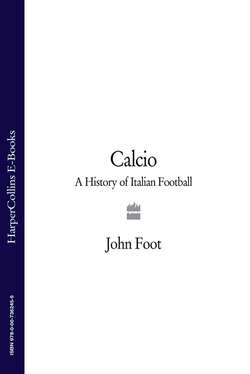Читать книгу Calcio: A History of Italian Football - John Foot - Страница 64
Milan. From humiliation to domination
ОглавлениеThe modern history of Milan can now be written only with reference to a key moment: 20 February 1986. Milan had just spent their second season in four years in Serie B. The team had been rocked by financial and on-the-pitch scandals, and was up for sale. In stepped a short, balding, grinning multi-millionaire, who had made his name and his fortune in the building trade, and then as Italy’s first private television mogul. Silvio Berlusconi had been born in Milan in 1936, and many claim that he was an Inter fan in his youth. He denies this (of course) but doubts remain. In any case, under Berlusconi, Milan’s success story has been dramatic: twenty-one years, seven scudetti and, above all, five European Cups. In that time, Inter have won three championships (and one of these was ‘awarded’) and two UEFA Cups. There is no comparison.
In May 2007 Milan beat Liverpool in Athens to avenge the traumatic defeat in Istanbul in 2004 and take their fifth European Cup. Once again, they had upstaged their bitter rivals. Milan fans took to the streets again, filling Piazza Duomo and clambering onto trams, buses and scooters. In the dressing room in Greece, Milan’s players made elegant reference to Inter’s championship win that year as they sang, ‘You can stick the scudetto up your arse.’ Back in Milan, the same slogan was displayed by the players on the team coach, causing a diplomatic incident. Berlusconi looked on, his famous smile as broad as ever.
Milan had had great teams before Berlusconi. The 1950s saw the club win four championships in ten years, with the legendary Swedish threesome – Gren, Nordahl and Liedholm – and a defence built around Paolo Maldini’s father, Cesare. Later the goalscoring prowess of José Altafini was allied to the silky skills of Uruguayan midfielder Schiaffino. By 1960–1961, manager Nereo Rocco had taken over. Under Rocco, with Gianni Rivera in midfield, Milan won two championships and two European Cups in the 1960s.
The 1970s were a time of frustration as three second-place finishes led to innumerable arguments with the referees. A memorable last-day collapse at Verona handed a title to Juventus. Ten years without a scudetto was an eternity for Milan, and they finally won their first gold star – awarded for ten championships – in 1979, Rivera’s last season. By that time, the team was transformed again and Franco Baresi was developing into a young star at the back. Yet disaster was soon to befall the club as betting and financial scandals and bad management led to two humiliating years in Serie B. A long period of mid-table obscurity followed, as the team rebuilt, slowly. Then, in 1986, Berlusconi arrived. Within a year he had bought the best three foreigners to play in Italy – together – in modern times – Gullit, Van Basten and Rijkaard. A number of brilliant young stars came through the ranks – with Paolo Maldini as the pick of the bunch. Milan were unstoppable for the next ten years, only dipping with the natural decline of that squad in the late 1990s. Berlusconi’s media and political power developed Milan into a world-famous business, and the influence of TV reinforced an oligarchy that excluded smaller teams. Some commentators have seen this northern big-city supremacy as something entirely new, although the Milanese and Turinese clubs have (almost) always dominated modern Italian football, apart from some brief and short-lived provincial or southern victories in the 1970s and 1980s.
Most Milan fans adored Berlusconi, yet some experienced the success story of their politician-president in a schizophrenic fashion, unable to separate their hatred for the politician from their admiration for the football president. Sometimes, hard-core fans claimed that he was neglecting his footballing commitments for political reasons, but Berlusconi always made sure he turned up at the stadium, and often interfered in tactical and transfer decisions. He was well aware of the power that AC Milan gave him on the national stage, and the ways in which the club’s triumphs naturally helped his personal fortunes in other spheres. With three national channels under his control, the product called ‘Milan’ was given hours and hours of free advertising and promotion, creating legions of new, young Milan fans ready to invest time and money in their support for their club and, often, for that club’s president in his many other careers. The club and its president were – as he had hoped – almost symbiotic. Of course, this could work both ways, and Berlusconi was furious when his team lost key matches. Football, when it came to Milan in the 1990s and beyond, was far more than just a game.
